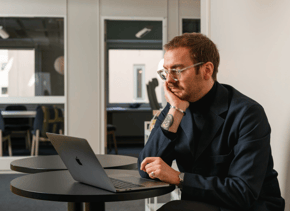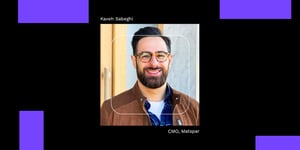Kaveh Sabeghi is a shining example of how you can go far without studying further after high school. As a self-taught entrepreneur and CMO at Matspar, he shares in this week's CMO Insights his best insights into the future, but also tips and advice for future market managers and CMOs.
Even as a child, Kaveh noticed he did not have the same reading head as other classmates. With his ADHD diagnosis, it has been a little more complicated to learn from school books or absorb information from lessons and lectures. In other words, the school was not a place where Kaveh flourished.
However, it is possible to succeed without devouring textbooks or graduating with the highest grades from one of the top universities. Kaveh is a shining example of that. He tells himself about his background, which only partially unexpectedly started in sales.
– Most professions I've worked my way through have only been about sales. I worked at SATS from 2007 to 2016, where, for the majority of the time, I was a site manager for a lot of different centres. All assignments were about boosting sales. To succeed, I understood that sales must be in sync with marketing.
He continues:
– In 2009, I started Kimura.se, today Sweden's largest MMA magazine, and needed to act as a real marketer. Marketing without a budget is not easy, but it can be done. "How do I get different channels to want to talk about us and drive traffic to us without charging?". It's a question that has always been relevant in my world, and I have constantly had to find the answer. The key has often been in collaboration. I have had to find different ways to provide a value that made other companies and people want to talk about us without charging. I brought the same idea to Matspar.se when we started the company in 2015.
"Acting big without testing small is not something to recommend"
There is no doubt that self-learning has given Kaveh lots of lessons and experience. When it comes to decision-making, Kaveh is happy to share both good and bad decisions he has made:
– It is easy to link your best decisions to successful marketing efforts or campaigns, but it is only the result of a fundamental decision. My best decision has been to not touch the money even though it is there and instead force myself, together with the organization, to think outside the box. It has resulted in many creative collaborations, new revenue and innovative solutions for the industry. When we then want to spend more money on our marketing, we know precisely in which basket to put it.
He continues:
– Acting big without testing small is not something to recommend. Something that works for others may not necessarily work for your company. In the past, I have tried to bet significantly due to a lack of patience and because I wanted quick results, but I have also learned that the worst decisions can turn into good decisions over time if you keep chasing the solutions. The best lessons are in the big mistakes.
AI and machine learning
At the time of writing, we're well into September, and the AI has accelerated. ChatGPT has been the big talking point, and Kaveh is convinced that AI and machine learning will take up more and more space in marketing departments nationwide. He also believes that e-commerce will continue to grow dramatically:
– We will see more and more people shopping for food, clothes and other things online. Logistics has long been a challenge for us. Still, its progress and the platforms' algorithms for personalization will make the buying journey more accessible and more accurate, which will lead to higher retention. Inflation has caused more and more people to turn to price comparison services, which are usually linked to e-commerce. This is, of course, one of the reasons for the growth. However, we have also seen that many people who buy food in physical stores start their shopping journey online. It doesn't just have to be linked to price. It can be linked to product information, inspiration or range.
– Quick commerce had a considerable boost before inflation, but now we see slow commerce increasing. People are holding tight to their money and planning even more carefully to decrease prices. You are thus prepared to wait several days and longer than that for your product. This habit I believe, will continue even when we see a boom.
Kaveh concludes:
– The issue of sustainability is still important, but it has shone a little with its absence during inflation as the price issue has covered every media. There is less of it now, but I am convinced it is only temporary.

